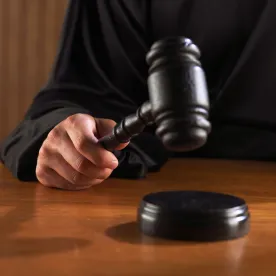An employer lawfully prohibited employees who interact with customers from wearing t-shirts printed with the words “Inmate” and “Prisoner” and containing black and white horizontal stripes, a federal appeals court has held, rejecting a 2-1 decision of the National Labor Relations Board. In Southern New England Telephone Company v. National Labor Relations Board, No. 11-1099 (D.C. Cir. 2015), the court held that “it was reasonable for AT&T to believe that the ‘Inmate/Prisoner’ shirts may harm AT&T’s relations with its customers or its public image,” thereby permitting the company to restrict the employees’ right to don union-messaged apparel.
The Communications Workers of America and the company were locked in difficult contract negotiations. The union gave workers, including those who enter customers’ homes, the disputed t-shirts to wear as a means to apply pressure on the company. The court recognized employees have a right under Section 7 of the National Labor Relations Act to wear clothing, buttons and other items communicating union support. However, quoting the Board’s decision in Nordstrom, Inc., 264 NLRB 698, 700 (1982), the Court observed that this right is qualified by a long-recognized “special circumstances” exception which is intended “to balance the potentially conflicting interest of an employee’s right to display union insignia and an employer’s right to limit or prohibit such display.” These “special circumstances,” it said, includes “protecting the employer’s product” and “maintaining a certain employee image.”
In affirming its administrative law judge’s decision, the NLRB had held that the t-shirt “would not have been reasonably mistaken for prison garb” and that “the totality of the circumstances would make it clear [that the employee was] not a convict.” However, the court found the NLRB applied the “special circumstance” exception in “an unreasonable way.” Finding “[the Board’s] expertise is surely not at its peak in the realm of employer-customer relations,” the court wrote that the test to be applied
is not whether AT&T’s customers would confuse the “Inmate/Prisoner” shirt with actual prison garb, but whether AT&T could reasonably believe that the message may harm its relationship with its customers or its public image. To resolve this case, it is enough to ask the question, as Member Hayes did in dissent: “What would you think about a company that permitted its technicians to wear such shirts when making home service calls?”
The court held that the company had proven the presence of special circumstances.
Unions often distribute t-shirts, buttons and the like for employees to wear in support of some union cause. While this activity generally is protected, when employees are in direct contact with customers or with patients, for example, employers should consider whether the “special circumstances” exception may be invoked to prohibit or limit the conduct.






 />i
/>i

